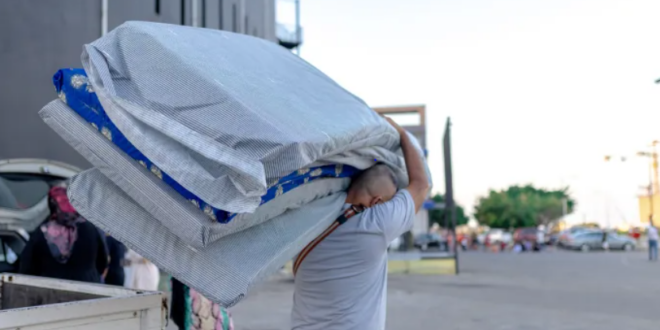“We are in need of two mattresses.” “Does anyone have an apartment for two families that left the south?” “Can someone provide baby clothes and milk? Urgent.”
Lebanese social media has been flooded in recent weeks by posts like these from people trying to crowd-source resources, relay urgent needs, organise fundraisers, and provide aid to the over one million people forced to flee their homes by the massive Israeli bombing campaign and attempted invasion of southern Lebanon.
With the weak and fractious Lebanese state doing little to mount a response to spiralling humanitarian needs, civil society networks have mobilised to try to fill the yawning gaps – stepping into a role they are well accustomed to from past crises.
“It’s in my DNA as a Lebanese person,” Maya Ayyache, a 30-year-old chef in Beirut, told The New Humanitarian. “We’ve been in this position so many times before, it’s second nature.”
“Because there isn’t a government to rely on for humanitarian aid or basic necessities, it’s only understandable that normal people will take it upon themselves to step in and make sure things get done and [that] people aren’t left out on the street hungry and cold,” Ayyache added.
Israel escalated its attacks in Lebanon in mid-September with a series of operations targeting the Lebanese political party and paramilitary group Hezbollah, including the assassination of Hezbollah’s long-time leader Hassan Nasrallah on 27 September in a massive airstrike on the group’s command bunker in Beirut’s southern suburbs.
Since then, Israel has launched a ground invasion of southern Lebanon, on 1 October, and has continued to heavily bombard southern Lebanon, the Bekaa Valley, and Beirut, while ordering residents of more than 100 towns and villages in the south to evacuate. Amnesty International has called the warnings “misleading and inadequate”.
An estimated 1.2 million people have been displaced, more than 2,300 have been killed, and over 10,000 have been wounded in Israeli attacks since last October. Nearly 1,500 of the deaths and around 90% of the displacement has occurred since 23 September, according to the UN and the Lebanese Ministry of Public Health.
“Because there isn’t a government to rely on for humanitarian aid or basic necessities, it’s only understandable that normal people will take it upon themselves to step in and make sure things get done and that people aren’t left out on the street hungry and cold.”
Israel says it is targeting Hezbollah, but civilians – including journalists and over 100 medics and emergency workers – have been killed. Having watched the Israeli military kill tens of thousands of civilians and lay waste to the Gaza Strip over the past year has led many in Lebanon to fear and anticipate the worst.
Many of those displaced by Israel’s bombing have come to Beirut to stay with family, friends, or strangers who have opened their doors. Schools and even nightclubs have been converted into shelters.
Ordering public schools to suspend classes and open as shelters for the displaced has been one of the few actions the Lebanese government has taken to address the crisis, but the move has also been criticised as coming without adequate preparations to provide basic necessities and services to people staying in the facilities.
Still, thousands of people have been unable to find space and are sleeping in the streets. Beirut’s waterfront corniche – usually crowded with walkers and joggers – is now dotted with tents where displaced people are sleeping. Others have simply laid down carpets on the ground, where they sleep among bags containing the few belongings they were able to bring from their homes.
“A lot could have been done to prevent the current disaster incurred by the displaced we’re seeing,” said Mona Harb, the co-founder of Beirut Urban Lab and a professor of Urban Studies and Politics at the American University of Beirut. “In a normal scenario of a functioning state, we would have had emergency plans by the state to evacuate properly and shelter people.”
No preparation
Many in Lebanon have in fact been bracing for the possibility of a wider war between Israel and Hezbollah over the past year, and warning of the devastating consequences one would have on a country already battered by overlapping political and economic crises.
Hezbollah began striking northern Israel in a show of solidarity with Hamas, the Palestinian political party and militant group that governs the Gaza Strip, the day after Hamas launched an unprecedented attack into Israel on 7 October.
Hezbollah has said it would end its bombardment – which has displaced tens of thousands of Israelis from the northern border region – if Israel agrees to a ceasefire to end the devastating war in Gaza that it launched in response to the Hamas attacks. But efforts to reach a ceasefire have repeatedly reached a dead end.
Despite consistent warnings about the possibility of escalation, the Lebanese government has done little to prepare for the humanitarian fallout from the expanding Israeli military campaign in Lebanon. The failure to organise evacuation routes from the south, for example, resulted in utter chaos when Israel dramatically escalated its attacks in mid-September.
Meanwhile, as a loan from the World Bank subsidising wheat nears its end, the Ministry of Economy and Trade has gone ahead with announcing a planned hike in bread prices. The move coincided with the mass exodus of people from southern Lebanon and underscored for many what they see as the state’s inability to provide relief.
Now, civil society networks in Lebanon find themselves in a familiar position: having to shoulder the responsibility of responding to humanitarian needs stemming from a dire crisis, with the state largely absent.
It is a pattern that has repeated itself time and time again throughout Lebanon’s recent history, according to Harb. “The model has been enduring since the civil war (1975-1990) and the crises and disasters associated with the civil war,” she said.
After the civil war, it was civil society that primarily responded to the humanitarian needs that stemmed from the previous Israeli wars in Lebanon with Hezbollah in 1996 and 2006, the Syrian refugee crisis starting in 2011, and the overlapping crises of Lebanon’s financial collapse in 2019, the COVID-19 pandemic, and the Beirut port explosion in August 2020. “It is perhaps not efficient and not equitable, but it is what we have, and it has been enduring,” Harb added.
Civil society steps in
Lebanese politics have been largely paralysed for a long time: The country has not had a president for nearly two years. Endemic corruption among the political class, and the recent financial crisis, have also created high levels of distrust between citizens and governing institutions, leaving many to feel they can only rely on each other.
When the displacement crisis began to escalate, chefs converted their restaurants into soup kitchens, animal shelters began coordinating efforts to rescue pets left behind when families evacuated, and bars and clubs were turned into shelters and drop-off points for donations.

Ayyache, the chef in Beirut, has been using her social media channels to collect donations from abroad, primarily from the Lebanese diaspora. However, due to the 2019 financial crisis, directing donations to the banking system – which has limits on how much money people can withdraw from their accounts during a given day and month – is not a viable option.
Withdrawing money from online donation platforms or from wire services, such as Western Union, has also become a challenging ordeal.
“We have to rely on Western Union, and we have a limit of four transactions a month before getting blocked,” Ayyache said. “We’ve also had to tread really carefully with other money transfer apps so we don’t get flagged.”
A Western Union agent in Beirut confirmed to The New Humanitarian that there is a four or five transaction limit per customer per month, regardless of the transaction amount.
Still, Ayyache said she managed to procure 500 mattresses, 300 pillows, and 300 blankets for a shelter using the money she has raised.
At Aleb, a restaurant that opened in Beirut six months ago, volunteers peel potatoes to help prepare hundreds of meals they are delivering each day. Ziad Abi Akar, the chef and owner, said he decided to shut down the restaurant during the current crisis. “It didn’t make sense to open, and [so we decided] to transform it into a soup kitchen. We’re capable of supplying 900 plus meals [per day],” Abi Akar said.
The decision, however, is coming at a price. “I am taking the biggest hit. It’s not sustainable for me. I’m using [money from] my own pocket. There’s no sustainability whatsoever,” Abi Akar added. But given the scale of the needs, he said he doesn’t see any other option.
Flawed, but no alternative
The communal spirit driving the volunteer response has also been present outside of Beirut in other parts of the country where the displaced have fled over the past year.
Israel’s intensified bombing of the Bekaa Valley and southern Lebanon in recent weeks has emptied towns and villages. The few inhabitants who have remained behind are in dire need of basic amenities. But only a handful of relief efforts continue to operate in these areas, as the danger increases every day.
In the city of Sidon, south of Beirut, MAAN (together, in Arabic) is one of the few initiatives still delivering assistance to the displaced.
“We are working on a specific mission that focuses on helping the families of the Lebanese people that were displaced from their houses by trying to maintain the basic needs, including food, medicine, mattresses, hygiene kits, and sanitary products,” said Amir Hijazi, the co-founder of MAAN.
But Israel has also been bombing Sidon since mid-September, which has made it more difficult for MAAN to work. “Mostly, so far, we [have been] able to go out, but we have a number of volunteers who prefer to help remotely, given the area around us keeps getting bombed, and it is dangerous to commute from areas around Sidon,” Hijazi added.
While all communities in Lebanon are being affected by the recent escalation of Israeli attacks, some groups are more vulnerable than others, especially Syrian refugees and migrant workers, who often lack official legal status and rights and face discrimination. Building on experience from past crises, activists advocating for these communities have mobilised to try to provide support for people being overlooked or deliberately excluded by other civil society initiatives.
In the absence of action from the state, the civil society response is all most people in Lebanon have to rely on. But it also has its flaws. “The danger of relying on NGOs and private donors in this context is [that] actions aren’t going to be coordinated, cohesive, and integrated across multiple sectors,” Harb, from Beirut Urban Lab, said.
People’s ability to access aid “depends on your social capital, your networks, and your proximity to providers themselves,” she added.
 موقع وجه أفريقيا موقع وجه أفريقيا هو موقع مهتم بمتابعة التطورات في القارة الأفريقية
موقع وجه أفريقيا موقع وجه أفريقيا هو موقع مهتم بمتابعة التطورات في القارة الأفريقية



